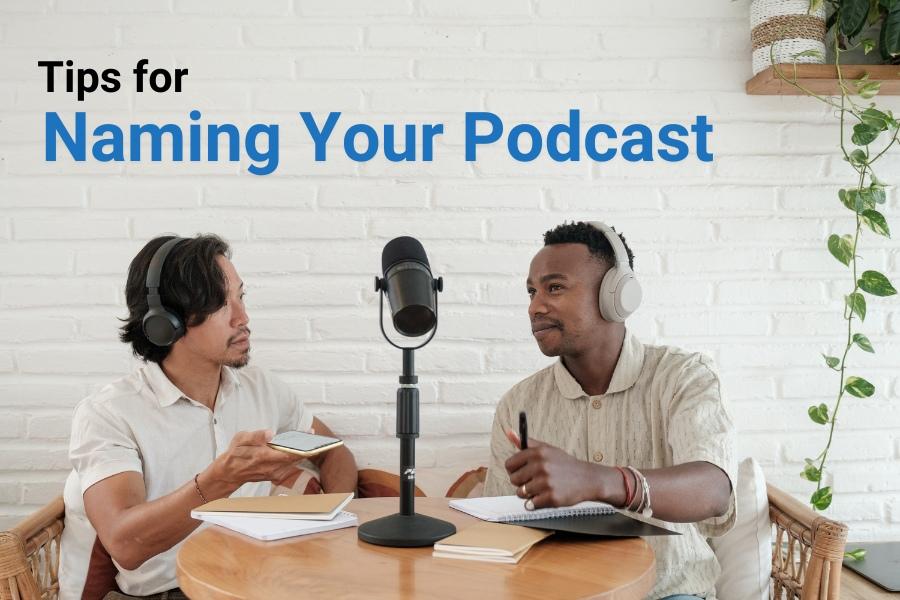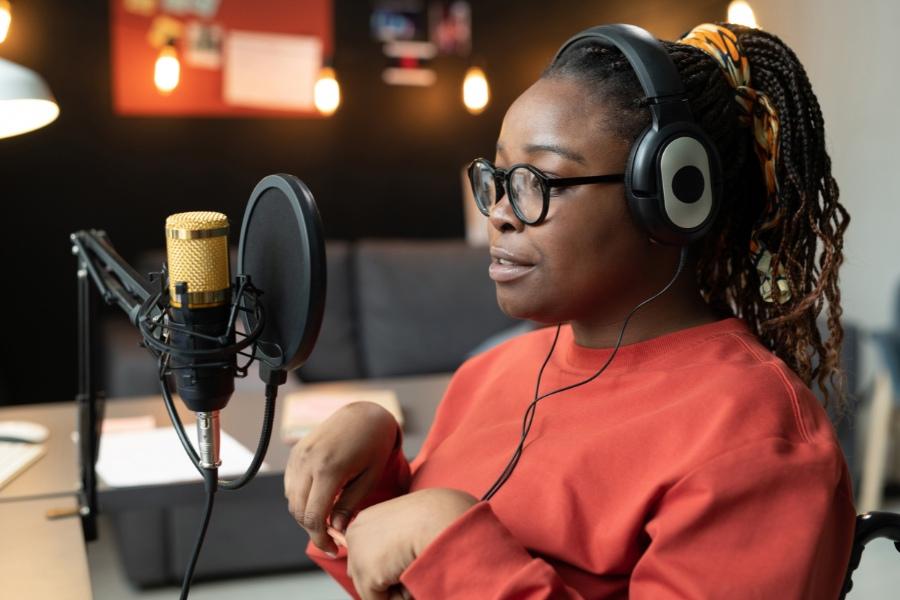
03 Mar Tips for Naming a Podcast: The Ultimate Guide for New Podcasters
Why Your Podcast Name Matters
Your podcast name creates the critical first impression that either attracts or repels potential listeners in the increasingly crowded podcasting landscape.
When someone scrolls through Apple Podcasts or Spotify, your title is often the first element they evaluate before deciding whether to click or scroll past. Think of your podcast name as the digital storefront of your audio content—it needs to be inviting, clear, and memorable enough to make listeners stop their scrolling and hit that play button.
At iRonick Media, we’ve guided countless new podcasters through the naming process, and we’ve witnessed firsthand how the right name can dramatically boost discoverability and listener engagement.
Throughout this comprehensive guide, we’ll explore everything from the psychology behind effective podcast names to practical techniques for testing your title before launch. We’ll also share real-world examples and insights from successful podcasters who’ve mastered the art and science of podcast naming.
The Psychology of Podcast Names: How Listeners Choose What to Play
Podcast names trigger specific psychological responses that influence whether potential listeners will engage with your content.
When a person is browsing through podcast directories, they typically make decisions about what to click in mere seconds, and your title plays a pivotal role in that split-second assessment. Research shows that podcast names that clearly communicate their content receive significantly higher click-through rates compared to clever but vague alternatives.
As Nick Knalbach shared during our Podcasting Morning Chat, “When I was searching for storytelling podcasts, I was looking very specifically for something related to storytelling and content creation. I skipped over quite a few of them because of the title.”
This behavioral pattern reveals three crucial psychological factors at play:
- Relevance signaling: Your name must quickly signal relevance to your target audience’s interests
- Expectation setting: The title sets expectations about the content, tone, and value of your show
- Cognitive fluency: Names that are easier to process mentally are more likely to receive positive evaluation
Remember: Most listeners won’t read your show description until after your title has captured their attention—if they even read it at all. As Alexandra noted in our podcasting discussion, “I’ll be completely honest. I don’t read the description.“
Three Main Categories of Podcast Names

Podcast names generally fall into three distinct categories, each with unique advantages and potential drawbacks for new podcasters. Understanding these categories will help you determine which approach aligns best with your content strategy and audience goals.
Creative and Abstract Names
Creative podcast names like “99% Invisible” or “The Moth” create intrigue and stand out in crowded directories. These titles work particularly well for established brands or when backed by major networks like NPR that can promote discovery through existing channels.
However, as our podcasting discussion highlighted, abstract names can be challenging for independent podcasters without established audiences.
While clever and creative can be good things, you need to consider someone who is browsing through tons of podcast listings, looking for the “right” one to listen to. That theoretical person needs to be able to quickly and succinctly be able to decipher exactly what your podcast is about based on your podcast name and cover art.
Descriptive Names
Descriptive podcast names clearly communicate the topic and target audience, making them ideal for new podcasters focused on discovery.
Titles like “Storytelling Your Brand” or “Financial Feminist” immediately tell potential listeners what they’ll gain from pressing play.
During our Podcasting Morning Chat, Doctor Faye emphasized: “For me, a title has to tell me what it’s about. It has to tell me who it’s for, and it has to have at least two keywords in it for discoverability.”
Host-Named Podcasts
Using your name in your podcast title leverages existing personal brand recognition but typically works best for those with established audiences.
Shows like “The Tim Ferriss Show” or “Conan O’Brien Needs a Friend” benefit from their hosts’ pre-existing fame.
For new podcasters without significant personal followings, relying solely on your name might limit discoverability.
Identifying Your Podcast’s Core Purpose and Message
Your podcast name should reflect the core purpose and unique value proposition that distinguishes your show from others in your category. Before settling on a name, take time to clearly articulate what makes your podcast special and what transformation it offers listeners.
Ask yourself these essential questions:
- What specific problem does my podcast solve for listeners?
- What unique perspective or expertise am I bringing to the topic?
- What transformation can listeners expect from engaging with my content?
When Jonathan sought advice for naming his new storytelling podcast, we first established that his core purpose was “to share stories as examples of how to tell a good story” and “to help people tell better stories” for personal and business branding. This clarity provided the foundation for considering appropriate naming strategies.
Remember that your podcast’s purpose might evolve over time, so choose a name with sufficient flexibility to accommodate growth. As one participant in our discussion noted about a too-specific title: “The Kombucha Brew is a fine title if you definitely want to talk about kombucha every single episode. Fermentation Nation, on the other hand, casts a wider conversational net.”
Know Your Audience: Tailoring Your Podcast Name to Your Target Listeners
Your podcast name creates the essential bridge between your content and your intended audience, speaking directly to their needs and interests. Understanding exactly who you’re trying to reach enables you to craft a name that resonates specifically with them rather than attempting to appeal to everyone.
At iRonick Media, we’ve found that developing detailed listener personas significantly improves naming effectiveness. Consider these audience-targeting approaches:
- Interest-based targeting: Names that reference specific topics, hobbies, or fields
- Problem-solution targeting: Names that imply solutions to common challenges
- Identity-based targeting: Names that speak to how listeners see themselves
Your perfect name depends entirely on who you’re trying to reach and what they’re searching for. Take time to research the search behavior of your target audience on podcast platforms.
What terms do they use? What competing shows are they already listening to? How can your name stand out while still signaling relevance?
Keywords and SEO: Making Your Podcast Discoverable
Strategic keyword placement in your podcast name dramatically improves your show’s visibility in both podcast directories and search engines. When potential listeners search for content in your niche, your podcast name serves as prime real estate for capturing those search queries.
Here’s how to approach keyword research for podcast naming:
- Identify primary search terms related to your podcast topic
- Research related secondary keywords that your audience might use
- Analyze competitor podcast names to identify patterns and opportunities
- Prioritize keywords by search volume and relevance to your specific content
During our podcast discussion, Nick shared his search process: “I initially think I just searched ‘storytelling’ to begin with… it was too broad for me. Like, I was looking at all the podcasts that exist, and I was like, okay. Yeah. Storytelling and a lot of stuff is like storytelling for authors.“
This experience highlights the value of niche-specific keywords in your title. Rather than competing for broad terms like “business” or “wellness,” consider more specific phrases that align precisely with your content—”solopreneur strategies” instead of just “business tips,” for example.
The Technical Side: Character Limits and Platform Requirements

Podcast platforms impose specific character limits and naming restrictions that directly impact how your title appears to potential listeners. Understanding these technical constraints helps ensure your carefully crafted name displays properly across all listening environments.
Here are the key technical considerations for podcast naming:
- Apple Podcasts: Titles ideally under 60 characters to prevent truncation
- Spotify: Similar display constraints with approximately 20-25 characters visible before truncation in some views
- Platform-specific rules: Apple now rejects titles with creator names appended at the end (e.g., “The Smart Dog Podcast with Jane Doe”)
- Prohibited elements: Most platforms reject titles containing excessive punctuation, special characters, or explicit language
During our Podcasting Morning Chat, Marc emphasized: “I usually recommend to people, keep the title under 60 characters because that will help ensure that you’re not gonna get that title cut off on those podcast players.“
It’s also worth noting that the word “the” at the beginning of your title can waste valuable character space.
The Perfect Length: Finding the Sweet Spot for Your Podcast Name
The ideal podcast name balances brevity with descriptiveness, typically landing between 3-4 words and 15-20 characters total. This length sweet spot ensures your title displays properly across platforms while remaining memorable and easy to reference.
The data from successful podcasts suggests shorter names have several advantages:
- Enhanced memorability: Shorter names are easier for listeners to recall
- Complete display: Brief titles avoid truncation in directory listings
- Better cover art integration: Less text means cleaner, more legible artwork
- Word-of-mouth sharing: Concise names are more likely to be shared accurately
During our discussion, we reviewed several podcast titles and found that overly lengthy names often created confusion or were shortened by listeners anyway. For example, “Real Life with Lee, South Florida 247365” might naturally be shortened to just “Real Life with Lee” in conversation.
When shortening your podcast name concept, focus on preserving the most distinctive and descriptive elements. Ask yourself: “If someone only remembered two words from my title, which two would best represent my show?”
The Pronunciation Factor: Creating Names That Sound Good When Spoken
Your podcast name must sound clear and distinctive when spoken aloud, as verbal recommendations drive significant podcast discovery. A name that trips up speakers or sounds awkward when pronounced will create barriers to word-of-mouth sharing.
To test pronunciation clarity, try these techniques:
- Say your name in various contexts: “Welcome to [Your Podcast],” “You should listen to [Your Podcast]”
- Ask others to pronounce it without coaching: Watch for hesitation or confusion
- Consider international pronunciations: Will non-native English speakers struggle with it?
- Avoid similar-sounding words: These can blur together in speech
- Test for audio distinctiveness: Does it stand out when heard in a list of other podcasts?
During our Podcasting Morning Chat, Jackie shared a cautionary tale about pronunciation confusion: “The woman that I was interviewing for my child’s genetic condition. Everybody said Karen, Karen, Karen. At the end of the interview, she said Corinne, and I almost died because I called her Karen the whole time.“
While this example relates to a guest’s name, it illustrates how easily pronunciation misunderstandings occur—a risk you want to avoid with your podcast title.
Visual Considerations: How Your Name Works With Your Cover Art
Your podcast name and cover art function as an integrated visual system that jointly creates your first impression in directory listings. The perfect podcast name complements your artwork rather than competing with it for attention.
Consider these visual naming principles:
- Length compatibility: Shorter names allow for larger text and better readability
- Color and contrast: Ensure your name is legible against your background design
- Font selection: Choose typefaces that enhance rather than obscure your name
- Visual hierarchy: Position your name prominently within the overall design
- Brand consistency: Align your podcast name styling with your broader brand identity
Nick Knalbach offered an interesting perspective on how different listeners prioritize these elements: “If I’ve been scrolling through podcasts just looking for something, I don’t have anything in particular that I’m searching for, I just want a podcast, then I usually end up using the thumbnails as a reference.”
This highlights how your name and artwork serve different purposes depending on how listeners discover your show—through directed searches versus casual browsing.
Avoiding Common Pitfalls: What NOT to Include in Your Podcast Name

Certain naming elements can significantly hinder your podcast’s discoverability, memorability, and professional appearance. Avoiding these common pitfalls will strengthen your podcast’s position in a competitive market.
Here’s what to avoid in your podcast name:
- The word “podcast”: This wastes valuable character space and states the obvious
- Special characters and symbols: These create search problems and look unprofessional
- Creative misspellings: These make your show harder to find through search
- Excessively clever puns: These can obscure your topic and limit discoverability
- Trendy references: These can quickly date your podcast as trends change
A common pitfall: choosing names with significance only to you rather than your target audience.
Trademark and Legal Considerations for Podcast Names
Your podcast name requires basic legal vetting to avoid potential trademark issues that could force a costly rebrand later. While most new podcasters won’t need formal trademark registration, performing due diligence helps protect your growing brand.
Take these essential legal precautions:
- Search the USPTO trademark database for existing registrations in your category
- Google your potential name plus “podcast” to identify unregistered competitors
- Check podcast directories for similarly named shows
- Search social media platforms for accounts using your proposed name
- Verify domain availability for your podcast name
During our discussion, several participants mentioned discovering that their preferred names were already taken, highlighting the importance of thorough research before committing to a name.
Remember that trademark protection applies to specific categories of goods and services. While you generally shouldn’t use a name identical to another podcast, using a name similar to a business in an unrelated field might be acceptable. When in doubt, consult with an intellectual property attorney for guidance specific to your situation.
Testing Your Podcast Name: Methods to Gather Feedback
Systematically testing potential podcast names with your target audience provides invaluable insight before you commit to a final choice. Gathering external feedback helps identify potential issues and confirms whether your name effectively communicates your content.
Try these testing approaches:
- Social media polls: Present 2-3 options to your existing followers
- One-on-one interviews: Ask potential listeners what they expect from each name
- Search behavior analysis: See which names people correctly recalled when searching
- First impression testing: Show people your name for 5 seconds, then ask what they remember
- A/B testing: If possible, test different names with similar artwork to isolate name impact
Feel like you’re running low on creativity with your podcast name? Leverage ChatGPT!
AI tools can supplement human feedback by generating options you might not have considered. The key is to then validate those suggestions with your actual target audience.
Tools and Resources for Podcast Name Generation
Specialized naming tools can jumpstart your creative process when you’re struggling to develop the perfect podcast title. While these tools shouldn’t replace thoughtful consideration of your audience and content, they provide valuable inspiration and alternatives.
Here are some effective resources for podcast naming:
- AI writing assistants: ChatGPT and similar tools can generate name options based on your podcast’s description
- Podcast-specific name generators: Tools like Buzzsprout’s podcast name generator create niche-relevant suggestions
- Word association tools: Sites like Wordnik or Relatedwords help expand your vocabulary around key concepts
- Thesaurus resources: Find alternative words to avoid generic or overused terms
- Brainstorming frameworks: Structured exercises like word banking or forced connections
Remember that tools like ChatGPT work best when you provide them with clear parameters about your podcast’s topic, audience, and tone. The more specific your input, the more relevant the generated names will be.
Case Studies: Successful Podcast Naming Transformations
Real-world podcast naming transformations demonstrate how strategic renaming can significantly impact a show’s growth and audience connection. These case studies provide practical inspiration for podcasters considering their own naming decisions.
Case Study 1: From Personal to Purposeful
The Challenge: Amanda’s podcast initially used the hosts’ names (“The Chris and Amanda Show”), which limited discoverability.
The Solution: They renamed to “Song Stop Showdown,” which clearly communicated the show’s musical focus.
The Result: Improved searchability and clearer audience expectations about the content.
Amanda reflected: “While people really did like that [original name], they didn’t really have any problem. It was hard for discoverability and the what exactly is it problem.“
Case Study 2: From Too Specific to Strategically Broader
The Challenge: A brewing-focused podcast initially named “The Kombucha Brew” found itself constrained by topic limitations.
The Solution: Rebranding to “Fermentation Nation” expanded the show’s scope while maintaining topic relevance.
The Result: The broader name allowed the host to explore related topics without confusing listeners, leading to content flexibility and audience growth.
Case Study 3: From Regional Confusion to Clarity
The Challenge: Ashley’s “Saint Andrews Jezebel Podcast” created geographic confusion since listeners thought of Scotland rather than Florida.
The Solution: A location-specific rebrand that clearly identified the Florida connection.
The Result: Better alignment with the podcast’s local focus and improved regional discoverability.
Ashley shared: “It didn’t tell at all that it was a local podcast, and that might have been part of the reason why I didn’t gain as much traction as I would like.“
Future-Proofing Your Podcast Name
A future-proof podcast name allows your content to evolve naturally without becoming restrictive or outdated as your show grows. Many podcasters find their focus shifting slightly as they develop their voice and respond to audience interests.
To create a name with longevity:
- Avoid hyper-specific topic limitations: “The Bitcoin Investment Show” restricts you more than “Digital Asset Insights”
- Skip year-specific references: Including “2025” in your title creates an immediate expiration date
- Consider your expansion plans: If you might add co-hosts or segments, ensure your name accommodates growth
- Test for changing context: Will your name still make sense if cultural references shift?
- Balance specificity with flexibility: Your name should indicate your general topic without boxing you in
During our discussion, we talked about how “Storytelling Your Brand” would give Jonathan room to explore various aspects of storytelling for business without limiting him to a single approach or technique.
The Ultimate Podcast Naming Checklist
Before finalizing your podcast name, run it through this comprehensive checklist to ensure it meets all critical naming criteria. This systematic verification process helps catch potential issues before they impact your launch.
Technical Verification
Under 60 characters total
No special characters or excessive punctuation
Easy to spell after hearing it spoken
Available across major podcast platforms
Not infringing on existing trademarks
Audience Connection
Clearly indicates topic/content
Appeals specifically to target audience
Sets appropriate expectations
Distinguishes from competitive shows
Memorable and shareable
Platform Optimization
Contains relevant keywords (preferably near beginning)
Avoids prohibited terms or structures
Works visually within cover art constraints
Passes platform-specific guidelines
Sounds natural when spoken in introductions
Brand Integration
Aligns with your overall brand voice
Domain name available
Social media handles available
Suitable for merchandise (if relevant)
Allows for future growth
When to Consider Rebranding an Existing Podcast

Rebranding your podcast becomes necessary when your current name actively hinders growth or no longer accurately represents your content. While changing an established podcast name carries risks, sometimes the potential benefits outweigh the temporary disruption.
Consider rebranding if:
- Your download metrics have plateaued despite consistent content quality
- Listener feedback indicates confusion about your show’s focus
- Your content has evolved significantly beyond your original concept
- You’ve received trademark concerns from another business
- Your current name creates technical limitations across platforms
If you decide to rebrand, create a transition plan that includes:
- Announcing the change several episodes in advance
- Explaining your reasoning to your audience
- Temporarily using both names (e.g., “Formerly known as…”)
- Updating all platform listings simultaneously
Cross-Platform Consistency: Domain Names and Social Media Handles
Maintaining consistent naming across your podcast, website domain, and social media accounts creates a unified brand presence that enhances discoverability. When listeners try to find you online, consistency eliminates confusion and builds professional credibility.
During our discussion, we emphasized the importance of checking domain and social media availability before finalizing your podcast name. As Marc noted: “Do some investigating online to confirm that your podcast name isn’t already taken.“
Follow these cross-platform naming best practices:
- Verify availability before commitment: Check domains and all major social platforms
- Prioritize your primary platforms: If you can’t get consistency everywhere, focus on your most important channels
- Use consistent abbreviations: If you must abbreviate on some platforms, do so consistently
- Consider purchasing similar domains: Protect against confusion with slight variations
- Claim your name early: Even if you’re not ready to launch, secure key accounts and domains
Taking Action on Your Podcast Name
Your podcast name represents the critical first step in building a show that connects with listeners and stands out in a crowded marketplace.
By approaching the naming process strategically rather than rushing into a decision, you set the foundation for long-term podcasting success.
Remember that the perfect podcast name balances multiple factors:
- It clearly communicates your content to target listeners
- It contains relevant keywords for discoverability
- It’s memorable and easy to share
- It allows room for your show to evolve
- It works across platforms and media formats
Now it’s time to put these principles into action. Start by brainstorming 15-20 potential names, then systematically evaluate them against the criteria we’ve covered. Test your favorites with potential listeners, and verify their availability across platforms before making your final selection.
Your perfect podcast name is waiting—one that will attract your ideal audience and set the stage for your podcasting journey. What will you call your show?
Get Expert Help Launching Your Podcast
Would you like to work one-on-one with a podcasting industry professional to make sure you excel at every step of launching your podcast? Click here to work with us at iRonick Media and ensure your podcast is set up for success.
